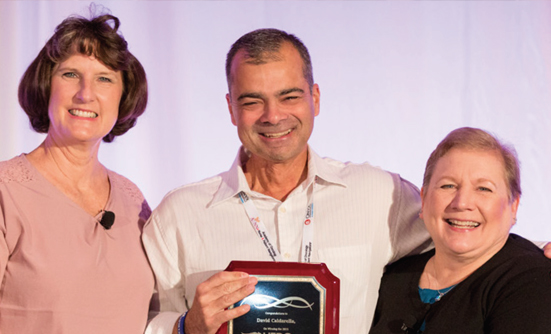Eating and drinking are simple tasks that many of us take for granted. But if you are diagnosed with a cancer in the head or neck, which collectively is called head and neck cancer (or HNC for short), you may have to learn this the hard way.
I entered the field of oncology nutrition because I believed that food is medicine. What I have since learned from my patients with HNC is that nutrition is not just medicine—it’s life. Proper nutrition and hydration are crucial throughout life, but especially when receiving treatment for HNC.
What Is Head & Neck Cancer?
HNC refers to one of many cancers that begin in the region of the head or neck. HNC tumor starts in a specific section of the head or the neck, including the oral cavity (the mouth, lips, or tongue); the nasal cavity (the nose and sinuses); the salivary glands; the pharynx (back of head from mouth to nose); and the larynx (neck or voice box). The majority of HNCs usually begin in the squamous cells that line the moist surfaces of the head and neck and are called squamous-cell carcinomas, but some HNCs can be different.1
Although HNC only accounts for about 4% of all cancer cases in the United States, according to the National Cancer Institute,2 patients with HNC have very high rates of malnutrition. Up to 50% of patients with HNC are already at risk for malnutrition before starting cancer treatment.3
As oncology dietitians, we look at eating habits, weight patterns, muscle mass wasting, and loss of body fat to evaluate malnutrition in our patients. The nutrition basics in this article provide information that will help all patients with HNC to improve their treatment.
What Are the Common Side Effects of HNC Treatment?
Treatment, including chemotherapy, radiation, and surgery, presents serious issues for patients with HNC. The common side effects from treatment can include taste changes, difficulty or painful chewing, difficulty swallowing, dry mouth, lockjaw, poor appetite, nausea, and vomiting.
Depending on what treatment regimen the patient is prescribed, the side effects can be minimal or severe. Ask your oncologist what to expect during treatment, so you can be properly prepared for the worse rather than let things catch up on you.
Maintaining Weight Is Key
The number one thing I stress to my patients with HNC is maintaining their weight and calorie intake. The goal for patients with any HNC is to avoid malnutrition and have a successful completion of treatment without interruptions.
If you stop eating and start losing weight, it can delay your treatment and worsen your condition. Nutrition becomes your lifeline—and getting in enough calories is your main goal. In addition, with all the stress on their body, patients with HNC often don’t realize how many calories they are burning in a day.
Some patients with HNC need a minimum of 3,000 calories a day just to maintain their weight. Speak to your oncology dietitian to get a better idea of your specific nutritional needs.
How to Maintain Your Weight During Treatment
Everyone is different, and each patient’s symptoms and treatment side effects will dictate what that patient can and cannot eat. Below are a few key nutrition strategies that work with most patients with HNC.
Start eating early. It can be easy to go all day without eating, especially if you are fatigued or not feeling well after treatment. Don’t let the whole day go by without eating anything—make the effort to start eating early in the day to create a wide window of opportunity to meet your daily nutritional needs.
Try eating 6 to 8 small meals throughout the day instead of 3 or less large meals. Small meals can be easier to digest and manage than large meals.
Set an eating schedule. When you are undergoing treatment, you may not feel hungry and have as strong an appetite as you were used to before. Don’t rely on hunger cues alone; try to look at the clock and set an eating schedule for yourself. Eating every 2 to 3 hours is a smart idea for most patients with HNC.
Maximize your calorie intake. Instead of eating more, try to maximize your meals by sneaking in extra calories. Add extra olive oil or butter when cooking. Use full-fat yogurt or milk instead of low-fat varieties. Add some extra avocado, guacamole, peanut butter, or hummus to your plate.
Try eating soft foods. If you have difficulty swallowing solid foods, soft foods may become your best friend. Try things such as blended soups or stews, puddings, yogurt, oatmeal, farina, mashed potatoes, and cottage cheese. Use gravy or broth to help moisten foods for easier swallowing.
Oral nutrition supplements, which are prepared nutritional drinks and shakes that are high in calories and proteins and are available in many stores, can help to provide patients a lot of calories, protein, vitamins, and minerals. Although these should not replace a meal, if you truly have a tough time eating, it is perfectly fine to drink oral nutrition supplements all day long, if that is the only thing you can tolerate. In addition, if you are feeling tired from treatment, opening the cap and simply sipping on an oral nutrition supplement is much easier than preparing a home-cooked meal.
For an extra calorie boost, try adding an oral nutrition supplement to your smoothie or blending it with ice cream for a high-calorie milkshake!
When Is It Time for a Feeding Tube?
There is so much pleasure and satisfaction involved in eating—it’s something that we often take for granted. When eating becomes difficult, however, your healthcare provider may suggest the idea of a feeding tube. Although this may sound scary, I have seen many patients who were saved by feeding tubes.
Think of a feeding tube as a life preserver you can still swim and move, but the life preserver is keeping you afloat. The same thing applies to a feeding tube you can still eat and drink if you are able, but the feeding tube is there whenever you need it as an alternative access to nutrition.
If you know that you will be undergoing a heavy treatment regimen, sometimes getting a feeding tube early on can be beneficial. Speak with your physician and dietitian if you are not sure about whether a feeding tube is right for you.
Think of Eating as Your Full-Time Job
When you lose your taste or have issues swallowing, eating can feel like a chore. Remember that maintaining your weight and getting enough calories is your job.
Nutrition becomes a full-time job for many patients with HNC. Although eating may not feel as pleasurable, it’s your lifeline during treatment and beyond. Focus on trying your best to meet your nutritional needs. If it’s too much, a feeding tube can be a very useful tool. You can do this!
Key Points
- Don’t let a whole day go by without eating: make the effort to start eating early in the day to have more time to meet your daily nutritional needs
- Try eating 6 to 8 small meals throughout the day instead of 3 or less large meals: small meals are easier to digest: eating every 2 to 3 hours is a smart idea
- Sneak in extra calories by adding extra olive oil or butter when cooking: use full-fat yogurt or milk instead of low-fat varieties, and add avocado, peanut butter, or hummus
- If you have difficulty swallowing solid foods, try soft foods, including soups or stews, puddings, yogurt, oatmeal, mashed potatoes: use broth to help moisten foods
- It is okay to drink oral nutrition supplements all day long, if that is the only thing you can tolerate
References
- National Cancer Institute. What are cancers of the head and neck? March 27, 2017. www.cancer.gov/types/head-and-neck/head-neck-fact-sheet#what-are-cancers-of-the-head-and-neck.
- National Cancer Institute. How common are head and neck cancers? March 27, 2017. www.cancer.gov/types/head-and-neck/head-neck-fact-sheet#how-common-are-head-and-neck-cancers.
- Isenring E. Esophageal and head and neck cancer. In Marian M, Roberts S, eds. Clinical Nutrition for Oncology Patients. Sudbury, MA: Jones & Bartlett; 2010:165-185.
Patient Resources
American Cancer Society
www.cancer.org/cancer/oral-cavity-and-oropharyngeal-cancer/if-you-have-head-or-neck-cancer.html
National Cancer Institute
www.cancer.gov/types/head-and-neck/head-neck-fact-sheet













